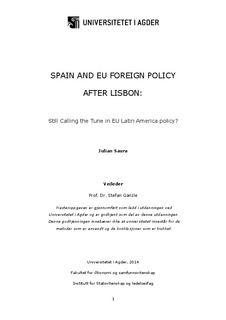| dc.description.abstract | Ever since its accession to the EU in 1986 Spain has been considered to be the main driver of
the EU Latin America policy, regardless of government. This particular domain of EU foreign
policy has for a long time been of relatively little interest among the other member states,
which in other words left Spain as its undisputed leader, with permission from Portugal. Spain
has therefore been quite successful in shaping EU Latin America policy according to its
national foreign policy preferences, in particular during the 1990s when conditions such as the
international context, the institutional set-up of the EU and the domestic factor were all
favorable.
These conditions did not remain constant and the new millennium presented Spain with a
quite modified picture. A striking modification to this picture was the Treaty of Lisbon. The
introduction of ‘Lisbon’ meant significant changes to the institutional set-up of the EU, and
possibly the removing or minimizing of what had been important channels through which
Spain had projected its Latin America preferences. At the same time ‘Lisbon’ introduced
developments set with the specific objective of strengthening EU foreign policy. Naturally,
this raised questions regarding the impact this would have on Spain’s further capacities to
shape EU Latin America policy.
This was analyzed through the scope of Europeanization and discussed on the basis of
theories that are central to European integration, such as institutionalism and
intergovernmentalism. The findings in this study suggest that ‘Lisbon’ is potentially very
positive to Spain’s capacities to shape EU Latin America policy, and even of an enabling
character, provided that Spain manages to adapt to the changes. The factors that are proving to
be challenging for Spain are rather the international context, the high number of EU member
states and challenges at the domestic level, and in particular the financial crisis. | nb_NO |
